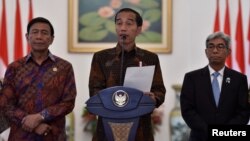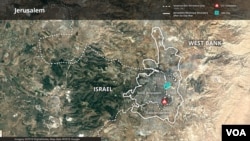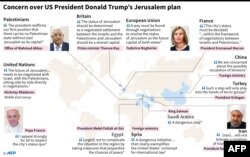Indonesia strongly criticized U.S. President Donald Trump’s decision to move the American Embassy in Israel from Tel Aviv to Jerusalem, a symbolic and controversial move that is seen as showing partisan bias for Israel since both Israel and the Palestinians claim the holy city as their capital.
Foreign Minister Retno Marsudi showed up at a democracy conference in Jakarta Thursday morning in a black-and-white keffiyeh scarf, a symbol of solidarity with Palestine, and did not mince words.
“We condemn this recognition,” she said, in her opening speech to the Bali Democracy Forum. “I stand here… wearing the Palestinian scarf to show the strong commitment of Indonesia, of the people of Indonesia, to always be with the Palestinian people, for their rights, Indonesia will always stand with Palestine.”
President Joko “Jokowi” Widodo also addressed the press from Bogor Palace on Thursday.
"Indonesia strongly condemns the United States’ unilateral recognition of Jerusalem as the capital of Israel and asks the U.S. to reconsider the decision," said Jokowi. “This unilateral recognition violates various resolutions from the U.N. General Assembly and Security Council, of which the United States is a permanent member, and can upset global security and stability.”
Unusually Strong Language
The swift denunciation, particularly from the typically reticent Jokowi, was a much stronger reaction than Indonesia has displayed to other controversial decisions by the Trump administration, including the so-called “Muslim ban” against travel from seven Muslim-majority countries in early 2017. Back then, Jokowi suggested that Indonesians “remain quiet” about the policy because they were not directly affected by it.
Indonesia is the world’s largest Muslim country and has long expressed solidarity with the Palestinian state, which has an unofficial “ambassador” in Jakarta. Israel does not have an Indonesian embassy or vice versa, and the two countries have no formal diplomatic ties, although they have quietly cooperated on trade and security for years.
In 2005, Indonesia’s then-foreign minister said that full diplomatic ties with Israel would only be possible after the Palestine issue was resolved.
Neighboring Malaysia, another Muslim-majority nation, also denounced the move.
"I call on all Muslims across the world to let your voices be heard, make it clear that we strongly oppose any recognition of Jerusalem as Israel's capital for all time," said Malaysian Prime Minister Najib Razak in Kuala Lumpur.
“It's not a surprise that President Trump had elicited condemnation from Indonesia,” said Andreas Harsono, a senior researcher with Human Rights Watch in Jakarta. “The heart of the problem is that Israel claims to treat Jerusalem as a unified city, but the reality is effectively one set of rules for Jews and another for Palestinians… Israel has been pushing occupied Jerusalem’s Palestinian residents to leave their homes through a policy of systematic transfer that violates international law.”
Anti-Israel sentiment mixed with anti-Semitisim
A darker aspect to Indonesians’ affinity for Palestine, which is shared across much of the Muslim world, is a deep current of anti-Semitism in Indonesian society.
“A lot of people identify with the Palestinian cause but honestly also hate Jews,” said Yohanes Sulaiman, a defense expert at General Achmad Yani University. “Even if they have never met a Jewish person in real life.
“Jews are another bogeyman in Indonesia,” he said, like Communists and LGBT people. There is a popular narrative of an “apocalyptic battle between the ‘good Muslims’ of Palestine and the evil Israelis,’ Sulaiman said. “It’s a no brainer for Jokowi to come out strong on this issue.”
Just last month there was a controversial “selfie exhibit” with a wax statue of Adolf Hitler in front of an illustration of the Auschwitz concentration camp that was forced to shut down in Yogyakarta. Earlier this year, a Nazi-themed cafe in Bandung finally closed its doors.









